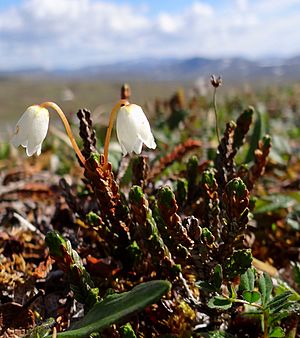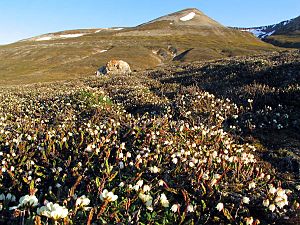Cassiope tetragona facts for kids
Quick facts for kids Cassiope tetragona |
|
|---|---|
 |
|
| Scientific classification |
|
| Kingdom: | Plantae |
| Clade: | Tracheophytes |
| Clade: | Angiosperms |
| Clade: | Eudicots |
| Clade: | Asterids |
| Order: | Ericales |
| Family: | Ericaceae |
| Genus: | Cassiope |
| Species: |
C. tetragona
|
| Binomial name | |
| Cassiope tetragona D.Don
|
|
| Script error: The function "autoWithCaption" does not exist. | |
Script error: No such module "Check for conflicting parameters".
Cassiope tetragona (say "KASS-ee-oh-pee tet-ra-GO-na") is a small, tough plant. It is also known as Arctic bell-heather or white Arctic mountain heather. This plant lives in very cold places like the Arctic and northern Norway. You can find it growing widely in these chilly regions.
Contents
What Does It Look Like?
This plant is a type of dwarf shrub, which means it's a small, woody plant. It usually grows to be about 10 to 20 centimeters tall. That's roughly the height of a pencil! It has many branches, making it look bushy.
Leaves and Flowers
- The leaves of Cassiope tetragona are special. They are grooved and stay green all year round.
- They are also scale-like and grow in four neat rows.
- The plant has pretty, bell-shaped flowers that grow by themselves.
- These flowers usually have white and pink parts, with pink anthers (the part that holds pollen).
- Sometimes, the petals can be yellowish-white.
- The flower stalks and the small leaves under the flower (called sepals) are often red.
- But they can also be yellowish-green, and the anthers can be brownish-yellow.
Where Does It Grow?
Cassiope tetragona likes to grow on ridges and open, grassy areas called heaths. It often grows in large groups, creating a unique and beautiful plant community. It thrives in the harsh conditions of the Arctic.
How Do People Use It?
This amazing plant has a few important uses for people living in the Arctic.
Fuel
- In Greenland, the native people use Cassiope tetragona as an important source of fuel.
- It has a lot of resin inside, which is a sticky substance.
- This high resin content means the plant can burn even when it's wet! This is very helpful in a cold, damp environment.
Cooking
- The plant can also be used in cooking.
- A Canadian chef named Louis Charest used Arctic heather as a smoked herb.
- He used it for a special dinner in 2016 called the "Three Amigos Summit."


